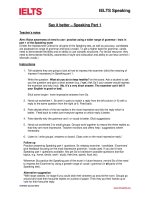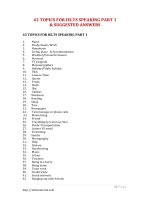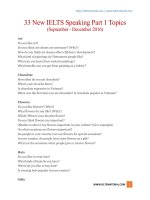Speaking part 1 what else could you say
Bạn đang xem bản rút gọn của tài liệu. Xem và tải ngay bản đầy đủ của tài liệu tại đây (26.2 KB, 3 trang )
IELTS Speaking
What else could you say? – Speaking Part 1
Teacher’s notes
Aim: Better able to meet Fluency and Coherence part of Assessment Criteria by developing
ability to speak at length using a range of connectives / discourse markers.
Instructions
1. As a warmer, write a sentence header (below) on the board and elicit different responses
from Ss. When you’ve elicited several responses for one sentence header, move onto the
next.
∑
∑
∑
I took my IELTS exam because…
I arrived on time for the exam, but…
I did well in the exam, so…
2. Tell Ss they’re going to look at extending their answers Speaking Part 1. Hand out the
worksheet and ask Ss to complete the dialogues with answers from the box (exercise 1).
Ss check in pairs then feed back.
3. Tell Ss that the words in bold are linking words and they are used to introduce extra
information. In the Speaking exam it’s important to extend answers as much as possible.
Ss complete exercise 2 to check that they understand how each linking word is used.
Check in pairs and feed back.
4. Put Ss in groups of 3 - 4. The teacher writes some Speaking Part 1 style questions on the
board (you might want to prepare these in advance or you could ask Ss to write them).
Student 1 answers question 1. Student 2 continues Student 1’s reply using a linking word
then adding to it, Student 3 continues Student 2’s reply using a different linking word then
adding to it. This continues until a student hesitates for too long (10 seconds?) or uses a
linking word which has already been used.
Example
Q1
What are your favourite colours?
Student 1: I love red…
Student 2: …because it’s the colour of love…
Student 3: …I guess green is also okay…
Student 1: …but I still prefer red…
Student 2: …Actually, all my clothes are red…
© British Council 2013
www.chinaielts.org
IELTS Speaking
ANSWER KEY – What else could you say? – Speaking Part 1
1
Dialogue 1
Examiner
Which relatives did you see most often when you were a child?
Candidate
I used to see my grandparents four or five times a week because d. I went
there after school when my parents were still at work but b. I don’t see them
as often now. Actually, c. I miss their company a lot so a. I’m planning to go
round more often in the future
Dialogue 2
Examiner
What kind of films do you like?
Candidate
It depends, *c. if I want some excitement I’ll see a horror movie, but *d. if
I’ve had a hard day, I might watch a comedy. Actually, a. I chose to watch a
comedy last night so I guess b. yesterday was a hard day.
*Note: phrases c and d can be swapped over
2
Which linking word is used:
1. To link together two different (or opposite) ideas? but
2. To introduce your opinion (like I think)? I guess
3. To introduce a reason for something? because
4. To introduce the result of something? so
5. To say that something is not certain – it is decided by something else? It depends
6. To introduce a fact / idea which may be surprising or unusual? Actually
© British Council 2013
IELTS Speaking
Worksheet – What else could you say? – Speaking Part 1
1
Below are two extracts of dialogues from an IELTS Speaking Part 1 test. Complete
the candidate’s answers with phrases from the box (a – d)
Dialogue 1
Examiner
Which relatives did you see most often when you were a child?
Candidate
I used to see my grandparents four or five times a week because ____ but
_____. Actually, _______ so ______.
a. I’m planning to go round more often in the future
b. I don’t see them as often now
c. I miss their company a lot
d. I went there after school when my parents were still at work
Dialogue 2
Examiner
What kind of films do you like?
Candidate
It depends, _______ , but ______. Actually, ______ I guess ________!
a. I chose to watch a comedy last night so
b. yesterday was a hard day
c. if I want some excitement I’ll see a horror movie
d. if I’ve had a hard day, I might watch a comedy
2
Which linking word (in bold above) is used:
1. To link together two different (or opposite) ideas? _____________
2. To introduce your opinion (like I think)? _____________
3. To introduce a reason for something? _____________
4. To introduce the result of something? _____________
5. To say that something is not certain – it is decided by something else? __________
6. To introduce a fact / idea which may be surprising or unusual? _____________
© British Council 2013









